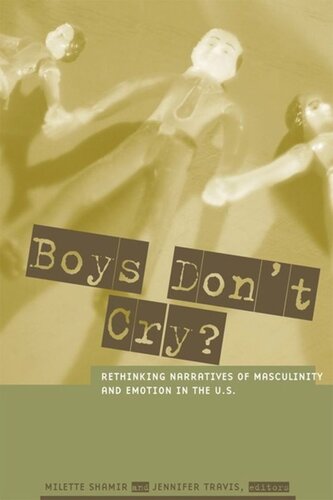

Most ebook files are in PDF format, so you can easily read them using various software such as Foxit Reader or directly on the Google Chrome browser.
Some ebook files are released by publishers in other formats such as .awz, .mobi, .epub, .fb2, etc. You may need to install specific software to read these formats on mobile/PC, such as Calibre.
Please read the tutorial at this link: https://ebookbell.com/faq
We offer FREE conversion to the popular formats you request; however, this may take some time. Therefore, right after payment, please email us, and we will try to provide the service as quickly as possible.
For some exceptional file formats or broken links (if any), please refrain from opening any disputes. Instead, email us first, and we will try to assist within a maximum of 6 hours.
EbookBell Team

4.3
28 reviewsWe take for granted the idea that white, middle-class, straight masculinity connotes total control of emotions, emotional inexpressivity, and emotional isolation. That men repress their feelings as they seek their fortunes in the competitive worlds of business and politics. This collection of essays by prominent literary and cultural critics rethinks such commonly held views by addressing the history and politics of emotion in prevailing narratives about masculinity. How did the story of the emotionally stifled U.S. male come into being? What are its political stakes? Will the "release" of straight, white, middle-class masculine emotion remake existing forms of power or reinforce them? This collection forcefully challenges our most entrenched ideas about male emotion.
We take for granted the idea that white, middle-class, straight masculinity connotes total control of emotions, emotional inexpressivity, and emotional isolation. That men repress their feelings as they seek their fortunes in the competitive worlds of business and politics seems to be a given. This collection of essays by prominent literary and cultural critics rethinks such commonly held views by addressing the history and politics of emotion in prevailing narratives about masculinity. How did the story of the emotionally stifled U.S. male come into being? What are its political stakes? Will the "release" of straight, white, middle-class masculine emotion remake existing forms of power or reinforce them? This collection forcefully challenges our most entrenched ideas about male emotion. Through readings of works by Thoreau, Lowell, and W. E. B. Du Bois, and of twentieth century authors such as Hemingway and Kerouac, this book questions the persistence of the emotionally alienated male in narratives of white middle-class masculinity and addresses the political and social implications of male emotional release.